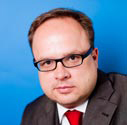A Few Fundamentals of EU Foreign Policy

Jan Techau
The German Marshall Fund of the United States
Jan Techau is a senior fellow and director of the Europe Program at The German Marshall Fund of the United States (GMF). As a foreign policy analyst, his research focuses on European integration and the EU’s role in the world, German foreign policy, transatlantic relations, and security and defense issues. Techau is co-author of Führungsmacht Deutschland – Strategie ohne Angst und Anmaßung (2017) and a regular contributor to German and international news media. Before joining GMF, Techau was the director of the Richard C. Holbrooke Forum for the Study of Diplomacy and Governance at the American Academy in Berlin. From March 2011 to August 2016, Techau was the director of Carnegie Europe in Brussels. Techau also served in the NATO Defense College’s Research Division in Rome from February 2010 until February 2011. He was director of the Alfred von Oppenheim Center for European Policy Studies at the German Council on Foreign Relations in Berlin between 2006 and 2010, and from 2001 to 2006 he served at the German Ministry of Defense’s Press and Information Department. Techau holds an MA in political science from the Christian-Albrechts-Universität in Kiel, Germany. He is an associate scholar at the Center for European Policy Analysis (CEPA) and an associate fellow at the American Institute for Contemporary German Studies (AICGS) in Washington, DC. He lives with his family in Berlin.
As Catherine Ashton, the first High Representative of the Union for Foreign Affairs and Security Policy, transitions out of her position, she is enabling her successor to create a comprehensive document outline of foreign policy challenges and their impact on the EU’s strategy. Detailing four such challenges in his recent essay published in Judy Dempsey’s Strategy Europe, Director of Carnegie Europe Jan Techau emphasizes the EU’s need to rethink its role in the world, citing fundamentals of the Union’s creation and continuing existence.
First noting that the EU must acknowledge its dependence on American military and financial resources, Techau argues that European planners must factor in the United States’ role, as it is unlikely to change. The second fundamental, he argues, is the necessity for the EU’s main focus to transition from intra-European relations to foreign policy. Third, the EU’s policy toward its eastern neighbors must take priority over North Africa and the Middle East. Finally, in order to respond faster to crises and developments, democracy itself must undergo the same technological revolution that society has.
Global decision-making often requires tremendous swiftness—a swiftness that classical democracy struggles to keep pace with. EU foreign policy strategists need to address this new form of democratic deficit, which will compound the EU’s existing crisis of legitimacy.
Ultimately, Techau argues that the EU’s importance as a foreign policy actor has changed, and so the EU must change itself accordingly.








